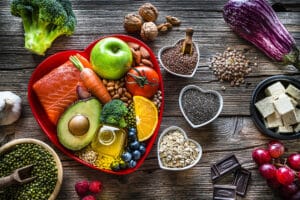Are you getting enough protein? The answer to this question probably depends on your protein choices. Protein deficiency is shockingly common, and is often caused by protein choices gone wrong! Many functions in the brain and body depend on adequate amino acids that can only be gotten from protein intake. Yet the surprise is that high protein programs frequently cause the protein problem to get worse. Here we will discuss protein choices and the good thinking that will lead to health instead of desperate diet extremes and disease.
Protein choices are more important than you think
Proteins do all sorts of things in our bodies. Enzymes are proteins, neurotransmitters and many hormones are proteins, fat is moved around and fluid is kept in the blood (rather than settling out as edema) by proteins. Of course, the body is rebuilt by protein when it is damaged or needs to replace cells. Too low protein is a serious problem for long-term health. Let’s introduce the problem of protein choices, and the solution with a true clinical story.
Amy drove up from south of Atlanta to see me while pregnant. She was about 5 months along and had been diagnosed with very low protein. She was not feeling well and wanted to have a home delivery.
Amy was taking large amounts of protein both by diet and as a supplement per recommendation of her caregivers. I checked her over and found low stomach activity and general toxicity. I knew she was not assimilating that protein she was being given. I also found evidence of allergies to just about everything that had dense protein in it. I took her off her protein supplement and put her on far more raw food, non-starchy vegetables and fruit. I also put her on cayenne pepper stirred into water (1/4 teaspoon) 15 minutes before every meal.
Cayenne increases digestive secretions by more than 300%, and contrary to popular belief, this generally stops heartburn.
In three weeks Amy made the drive again to see me and announced that all her amino acid levels were normal and she was not showing up low in protein anymore. She was feeling better. At her second visit we put her on a few supplements for an endocrine imbalance she had. At term she was able to deliver a healthy baby at home without complications!
Amy’s pattern is not unique. Her allergies probably appeared after she was unable to digest protein well. Once the allergies appeared to all that undigested protein, her hope of recovering her normal protein levels by eating high protein foods was shattered. She needed to use less concentrated protein and to digest it better. This was okay, though, because she could get plenty of protein from vegetables and fruit if she could digest it well.
Frequently, terror is stricken into the hearts of meat-lovers everywhere when they are presented with the idea that they can get enough protein from fruits and vegetables. Objections come quickly afterwards. Actually, though, if we just talk about percent of calories from protein, fruit never gets below 4%. After birth, we are growing the fastest in the first few months and our cells are dividing faster than they ever will again in our lives. During this time our mother’s milk increases to, at most, 3.5% protein. In other words, fruit has more calories from protein than mother’s milk has, and in theory should more than meet our protein needs.
The issue should be whether we are getting everything we need and assimilating it. If we eat a variety of fruits, even from this fruit we will get the 8 essential amino acids. We can store some amino acids in our bodies for up to 30 days, making it so that even people on a very limited diet are likely to do just fine as far as protein intake is concerned.
Getting enough protein is not the real problem
Far more common are problems with assimilation. This issue is big because of stress, allergies, poor diets and diets too high in starch. Stress shuts down digestion, allergies cause so much irritation and inflammation that normal digestion does not take place, and depleted food results in depletion of enzymes in the body that impede digestion. Actually, one intake problem in our culture is the ratio of starch to protein. When we take in too much starch, the body’s ability to metabolize protein in adequate amounts is inhibited. Whether this is by some action in the digestion of too much starch, or an increase in protein needed to process starch in the body is not known, but the problem is very observable.
This is why a person who is put on non-starchy vegetables, fruit, nuts and sprouted seeds and who is given something to aid digestion (like the cayenne mentioned above) will often recover very quickly from protein deficiency.
In conclusion, protein metabolism produces lots of wastes, which exhaust the body. If it is possible to get plenty of protein on a lower protein diet, it is desirable. Even some body builders have managed to do quite well on a healthy diet of whole plant foods and not consuming any concentrated protein supplements, even from the plant kingdom.
It is balance that the body wants and needs, and this generally is found in healthy plant cells, which can then make healthy ‘you’ cells. It has been said that what we don’t eat is more important than what we do eat. This can be true if what we do eat has some living, healthy plant cells in it. Muscle built on this kind of food is better toned and does not atrophy easily. It is one of the signs of healthy muscle and a healthy person.




